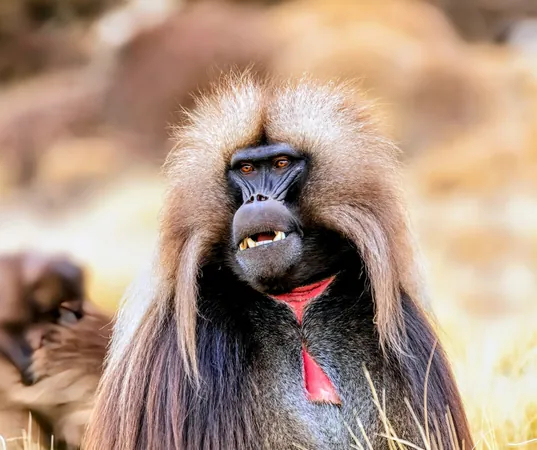
The Hidden Struggles of Alpha Male Baboons: Is Dominance Worth the Cost?
2025-01-23
Author: Jessica Wong
When we picture the strong and dominant figures in nature and society, from lions and wolves to CEOs, we often romanticize what it means to be an alpha. They seem to command respect, enjoy superior resources, and relish in their top-tier status. However, new research unveils the heavy price alpha male baboons pay for their power, challenging our perception of dominance.
The Pressure of Leadership
Aspiring to be the alpha male of a baboon troop involves significant challenges. Males must fight their way to the top through a combination of raw strength, cunning strategy, and relentless perseverance. But reaching that coveted position is merely the beginning of a grueling reality. To maintain their dominance, alpha males must be ever-vigilant, safeguarding their rank from rivals and primarily monitoring the troop's females.
During the females’ fertile periods, alpha males are tasked with a demanding responsibility: ensuring that other males do not mate with them. This often entails following females incessantly for days, which not only threatens the stability of their physical and mental health but also leaves little room for essential activities like resting, eating, or socializing.
Professor Susan Alberts from Duke University describes this relentless behavior as the males "staking a claim" to their mates, revealing just how exhausting their leadership role can be.
The Toll of Stress on Alpha Males
A long-term study by scientists in Kenya through the Amboseli Baboon Research Project has provided significant insights into the social behaviors of baboons since 1971. Findings from previous research hinted that the life of an alpha male was fraught with stress, as revealed by elevated levels of glucocorticoids, hormones associated with stress and the body's "fight or flight" response.
The most recent study, analyzing 14 years of behavioral data from 204 male baboons, confirms these findings, showing that alpha males exhibit 6% higher glucocorticoid levels than their lower-ranking counterparts. Surprisingly, the researchers discovered that physical confrontations with rival males did not correlate with higher stress levels. Instead, it was the time spent guarding females that caused stress spikes, indicating a less tangible but more psychologically taxing source of difficulty.
Furthermore, the alpha males exhibited lower thyroid hormone levels, reflecting a concerning rate of calorie burn that exceeded intake—a clear signal that their leadership is not just stressful, but physically draining as well. Unlike other males who can focus on their nourishment, alpha males are frequently interrupted, losing precious time that could be spent eating or resting.
Longevity and Leadership Costs
The repercussions of this state of stress extend beyond immediate discomfort. Research indicates that alpha male baboons tend to age faster and have shorter lifespans compared to their peers. Chemical changes in their DNA, indicative of accelerated aging due to stress, impair their long-term health. Once these powerful figures lose their position, the years of physical and emotional strain can leave them struggling to regain their former vitality.
Lessons for Human Society
Although baboon society operates under different dynamics than human societies, parallels exist, particularly regarding leadership stress. Humans traverse various social hierarchies, and the burden of leadership in any domain can lead to similar consequences. The implications of this research extend beyond the baboon troop; they underscore the fact that authority often comes at a substantial personal cost.
As we learn from the experiences of alpha male baboons, we can reflect on the broader implications of striving for power and status in our lives. True leadership requires not only skill and strategy but also comes with the necessity of managing stress for sustained well-being. Ultimately, for the alpha baboons, the unyielding pressure of being at the top is profoundly revealing: the quest for dominance can carry a significant toll on health and longevity.
This pivotal study is published in the esteemed journal *Proceedings of the Royal Society B*, adding to the growing body of knowledge about the complexities of social hierarchies in the animal kingdom.




 Brasil (PT)
Brasil (PT)
 Canada (EN)
Canada (EN)
 Chile (ES)
Chile (ES)
 Česko (CS)
Česko (CS)
 대한민국 (KO)
대한민국 (KO)
 España (ES)
España (ES)
 France (FR)
France (FR)
 Hong Kong (EN)
Hong Kong (EN)
 Italia (IT)
Italia (IT)
 日本 (JA)
日本 (JA)
 Magyarország (HU)
Magyarország (HU)
 Norge (NO)
Norge (NO)
 Polska (PL)
Polska (PL)
 Schweiz (DE)
Schweiz (DE)
 Singapore (EN)
Singapore (EN)
 Sverige (SV)
Sverige (SV)
 Suomi (FI)
Suomi (FI)
 Türkiye (TR)
Türkiye (TR)
 الإمارات العربية المتحدة (AR)
الإمارات العربية المتحدة (AR)